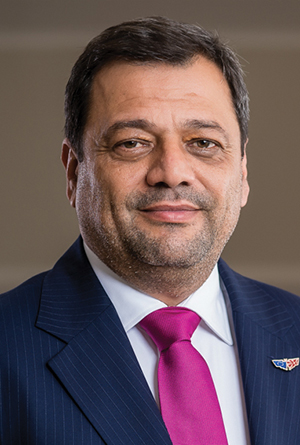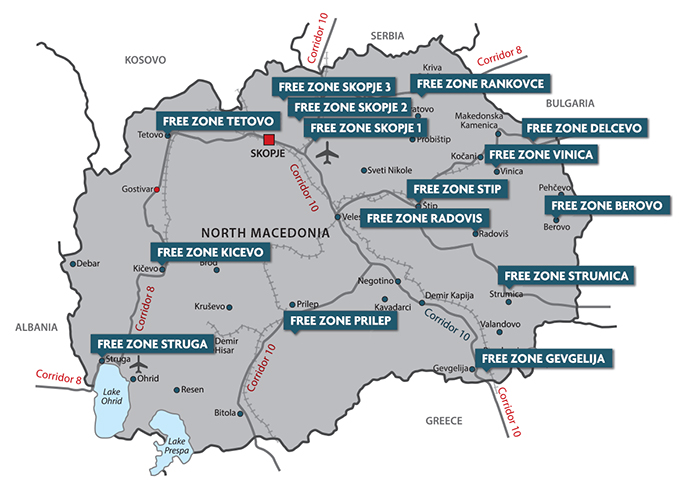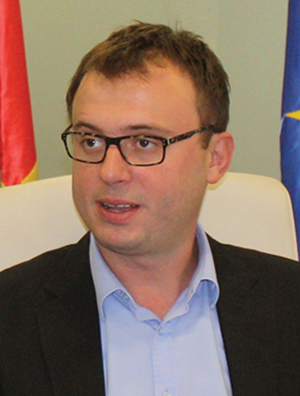North Macedonia is an ideal location for expanding our production,” said Dietmar Siemssen, CEO of Düsseldorf, Germany–based Gerresheimer AG, in March 2019 when the company announced it would invest tens of millions of euros in a new plant making plastic systems and prefillable syringes that could employ up to 400. “The country offers good infrastructure, cost structures, trained personnel and excellent support from the authorities.”
Essential to that good infrastructure is the network of free industrial zones, where Dura Automotive is investing €18 million (with plans to double that amount within 10 years), and hiring 500 at a new plant. Swiss electronic sensor firm Baumer is investing around €9 million, with 300 to 350 jobs planned.

The big news, however, is North Macedonia itself — a new name for the country that became constitutionally official in January after successful high-level negotiations with Greece.
North Macedonia Deputy Prime Minister Koco Angjushev and Aleksandar Mladenovski, CEO of North Macedonia’s Free Zones, talked to me about the country’s strong value proposition today. Angjushev, appointed Deputy Prime Minister for Economic Affairs in June 2017, is a longtime professor of mechanical engineering and business leader who knows what it takes to lead a firm, and says countries must meet certain preconditions to attract one.
“The first one is rule of law, so that all parties are directly protected. In that regard, our country has invested its maximum efforts, and not a single economic entity or economic operator in the country has issues with the rule of law. The second component is that the investor should feel that the capital is safe and that the country is stable. When it comes to stability, this government has done more than any other so far, especially by resolving all open disputes with our neighbors and by joining NATO. Finally … is the fact that every investor wants to see that they will achieve economic benefit. That is precisely why we structured the measures for financial support of investments in a way that all entrepreneurs want to see. I believe that we have the most competitive measures in the region and beyond."
Last year those measures contributed to signing 19 FDI agreements, reaching the highest annual level of FDI in history: €624 million. “This is 6% of the GDP and is three times more compared to the average of the previous years,” says the deputy prime minister.

Skopje dominates as a metro area, accounting for more than 45% of the nation’s GDP, and ranking in the top five in Eastern Europe and Central Asia in the automotive, energy and chemicals/plastics sectors in the 2018 World’s Most Competitive Cities report. But the region has no monopoly on zones. A prime example is the eastern city of Stip, where a textile heritage means skilled local workers are available to investors.
“Other regions in the country are more conducive to other industries and specialization, such as electronics or automotive," Mladenovski says of the free zones, which have helped nearly halve unemployment from 38% to 19.4%. "Additionally, with infrastructure improvements such as completion of construction of the Skopje-Stip highway, only 20 minutes will be needed to travel between Stip and Skopje.”
The infrastructure of success includes a service and supply ecosystem of North Macedonian firms, as well as partnerships with universities. Tailor-made vocational training programs have been created at the University of St. Cyril & Methodius, as well as the University of Bitola to develop potential employees for such companies as Adient (formerly Johnson Controls, investing $45 million in Stip and Strumica), Johnson Matthey, Kromberg & Schubert and Dräxlmaier.
Small Is Beautiful
Deputy Prime Minister Angjushev is familiar with European clusters of engineering talent. Asked how his country’s workforce measures up, he says, “One of the advantages of our country is that we have good personnel — young, intelligent and well educated people." Being small has its benefits, he says, “because we can adjust the programs of the faculties to the needs of foreign investors." Moreover, companies can be subsidized up to 50% of the cost of investment by the government, using the instruments for direct financial support and tax and customs subsidies.
The EU’s Stabilization and Association Council has complimented North Macedonia on its “neighborly” approach with Greece, Bulgaria and others. Angjushev says cooperation with neighbors that has come about through the Berlin Process (whereby Balkan states gradually integrate with the EU) has intensified, and already is yielding results, including reduction of administrative barriers, easier border crossing and re-engagement with companies.

India’s Malhotra Cables first considered investing in North Macedonia in 2016. “The project ultimately did not succeed then,” Mladenovski says, “but I am pleased to announce that Malhotra has now decided to invest in the Skopje 2 free zone, and will produce cables for the automotive industry.”
Word of mouth from such companies is the country’s best marketing, says Angjushev, but the government is taking things further, opening new offices in the U.S., Germany and the Middle East.
Free zones are working for industry. But North Macedonia also could be called a leisure and tourism zone, with 80 wineries and 16 wine districts, UNESCO-protected Lake Ohrid, several ski destinations and a range of arts festivals. Deputy Prime Minister Anjushev says foreign visitors not only feel welcome, but tend to linger, “because the people are friendly, life is good, and the food and nature are excellent. I personally know many people who came here and do not want to leave.”
When it comes to supporting global companies’ growth, North Macedonia’s free zones aim to do the same.
This Investment Profile was prepared under the auspices of the Republic of North Macedonia Free Zones (DTIDZ). For more information, visit www.fez.gov.mk.

